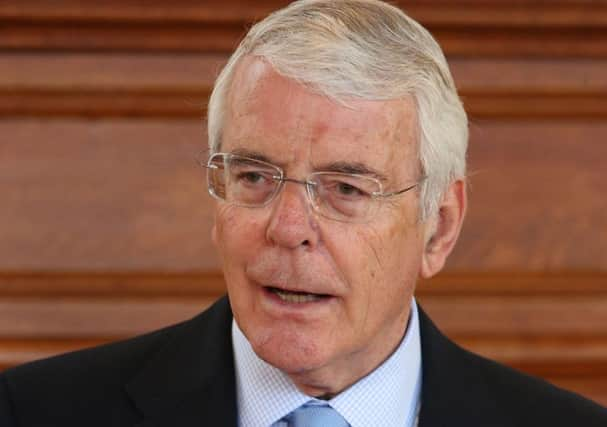Major tells May: more charm, please, and less rhetoric


In a stinging attack, the ex-Tory leader said he had watched with “growing concern” over the way the country has been led to expect a future outside the European Union that is “unreal and over-optimistic”.
Voters must be told how the outcomes of the negotiations will affect them, Sir John said as he warned the most vulnerable are likely to be hit hardest by the impact of quitting the bloc.
Advertisement
Hide AdAdvertisement
Hide AdIn a speech at Chatham House in London, he said: “I have watched with growing concern as the British people have been led to expect a future that seems to be unreal and over-optimistic.
“Obstacles are brushed aside as of no consequence, whilst opportunities are inflated beyond any reasonable expectation of delivery.”
Sir John said the talks require “statesmanship of a high order” and warned of a “real risk” of the exit deal falling “well below the hopes and expectations” that have been raised.
“I see little chance we will be able to match the advantages of the single market,” he said.
Advertisement
Hide AdAdvertisement
Hide Ad“In my own experience, the most successful results are obtained when talks are conducted with goodwill: it is much easier to reach agreement with a friend than a quarrelsome neighbour.
“Behind the diplomatic civilities, the atmosphere is already sour. A little more charm, and a lot less cheap rhetoric, would do much to protect the UK’s interests.”
The former premier’s time in Number 10 was marked by a series of bruising battles with his own MPs over Europe and his outspoken opposition to quitting the bloc has previously angered Eurosceptic Tories.
Sir John said Leave voters backed Brexit in the belief it would improve their lives.
Advertisement
Hide AdAdvertisement
Hide Ad“If events go badly, their expectations will not be met, and whole communities will be worse off,” he said. “The particular fear I have is that those most likely to be hurt will be those least able to protect themselves.”
Sir John said it was “time to stop” the attacks on Remain supporters, insisting they are demeaning and intolerant.
He told how pro-EU voters had contacted him in “dismay” and “despair” over the way they are being told to keep quiet and toe the line.
“A popular triumph at the polls - even in a referendum - does not take away the right to disagree - nor the right to express that dissent.
Advertisement
Hide AdAdvertisement
Hide Ad“Freedom of speech is absolute in our country. It’s not ‘arrogant’ or ‘brazen’ or ‘elitist’, or remotely ‘delusional’ to express concern about our future after Brexit.
“Nor, by doing so, is this group undermining the will of the people: they are the people. Shouting down their legitimate comment is against all our traditions of tolerance. It does nothing to inform and everything to demean - and it is time it stopped.”
During the speech he called for ministers to be trusted to carry out the negotiations but insisted Parliament should not be treated as a “rubber stamp”.
Brexit has “energised” anti-EU, anti-immigrant nationalism in other European countries, including France, Germany and Holland, he said.
Advertisement
Hide AdAdvertisement
Hide Ad“I caution everyone to be wary of this kind of populism,” he added. “It seems to be a mixture of bigotry, prejudice and intolerance.
“It scapegoats minorities. It is a poison in any political system - destroying civility and decency and understanding. Here in the UK we should give it short shrift, for it is not the people we are - nor the country we are.”
Sir John warned that Britain is becoming more dependent on the United States at a time when the president is “less predictable, less reliable and less attuned” to Britain’s ways than any of his predecessors.
He warned against those who want the UK to crash out of the EU and adopt World Trade Organisation rules.
Advertisement
Hide AdAdvertisement
Hide AdHe said: “There is a choice to be made, a price to be paid; we cannot move to a radical enterprise economy without moving away from a welfare state.”
A No 10 source said: “The Government is determined to make a success of our departure from the European Union and to move beyond the language of leave and remain to unite our country.
“The Prime Minister set out her 12 negotiating objectives for Brexit in January. We have a clear plan to get the best deal for the United Kingdom and are going to get on with the job of delivering it.”
Labour’s Chuka Umunna, a supporter of Open Britain, the campaign group calling for close links to be retained with Brussels, said: “It is absolutely right to warn that if the Government continues on its current course, we will end up with the kind of hard, destructive Brexit that costs jobs and damages our economy.
Advertisement
Hide AdAdvertisement
Hide Ad“The Government have promised to get a deal that delivers the ‘exact same benefits’ as we have today. Sir John is right to question how likely that is, but there is no chance at all of it being delivered if our European partners across the negotiating table continue to be demonised.
“It is vital that Parliament is given a meaningful vote on the final agreement, with the power to send the Government back to the negotiating table if the deal they come back with is not good enough for Britain.”